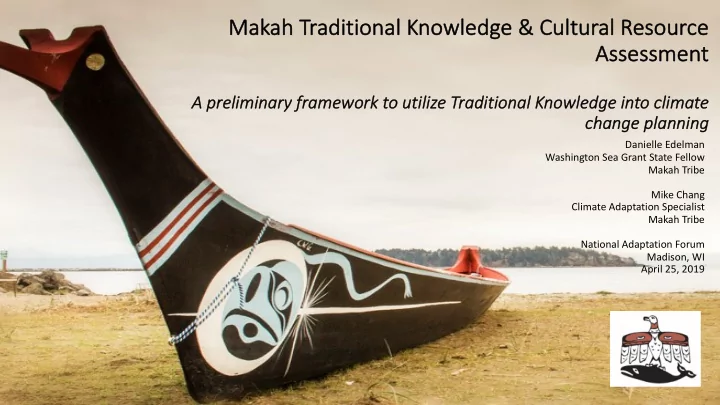

Ma Makah Traditi tional Knowledge & Cultu tural Resource Asse Assessm ssment A prel eliminary y framework to utilize e Traditional Knowled edge e into climate e change e planning Danielle Edelman Washington Sea Grant State Fellow Makah Tribe Mike Chang Climate Adaptation Specialist Makah Tribe National Adaptation Forum Madison, WI April 25, 2019
Ov Overview of f the Makah Tribe • Qᵂidicca?a’tx - “People of the Cape” • 1855 Treaty of Neah Bay • Ceded 300,000 acres of land to the U.S. and reserved the rights to hunt, fish, gather, whale, and seal within surrounding Usual and Accustomed Areas • Makah identity, culture, and economy are dependent on natural resources, especially from the ocean • “The sea is my country.” • Current Reservation ~47 sq miles
Makah Climate Adaptation Logic Model Climate Change Adaptation and Climate Change Impacts Implementation Plan Assessment Traditional Knowledge and Carbon Offset and Mitigation Plan Cultural Assessment Community Engagement Strategy Community Outreach and Education Plan
Makah Climate Change Workgroup Core Team •Katie Wrubel: Natural Resources Policy Analyst •Rob McCoy: Forestry Manager •Seraphina Gagnon: Project Coordinator I •Shannon Murphie: Wildlife Biologist •Michael Chang: Climate Change Consultant •Dave Herda: GIS Manager •Zak Greene: Former Climate Change Consultant •Rebekah Monette: Historic Preservation Officer •Dana Sarff: Former Environmental Division Manager •Michelle Smith: Planner III •Haley Kennard: Hershman Marine Policy Fellow •Jerry Gardener: Former Emergency Management Coordinator •Stephanie Martin: Habitat Division Manager •Rickson Kanichy: Emergency Management Coordinator •Doug Sternback: Air Quality Specialist •Patty Manuel: Operations Director •Aaron Parker: Former Water Quality Specialist •Dave Lucas: Public Works Manager •Riley Smith, Water Quality Specialist •Patrick Anderson: Former Makah Clinic Director •Adrianne Akmajian: Marine Ecologist •Roxanna Phillips: Makah Clinic • •Chad Bowechop: Office of Marine Affairs Manager Danielle Edelman: Marine Policy Fellow •Laura Nelson: Marine Affairs Consultant Advisors •Forrest Howk: Former Marine Affairs Consultant Russell Svec: Fisheries Director Ray Colby: Assistant Fisheries Director Hap Leon: Fisheries Biometrician
Makah Traditional and Local Knowledge Framework • Define historical baselines and observational environmental changes; • Identify critical cultural resources and activities; • Identify culturally-relevant adaptation strategies; • And be able to engage the community into the climate planning process.
Ethical Considerations • Usage of the term “climate adaptation” within Indigenous communities context • Methods of gathering TK -> “Free, Prior, and Informed Consent” • Considerations around complementing Western science with TK
Defining Traditional Knowledge “TK or TEK is built on personal experience and interaction with peers, including people from other communities and passed on through stories, apprenticeship, and practice. It can be understood as knowledge and skills that are fluid, dynamic, flexible, adaptable, and continually updated and revised in light of new observations and experiences, and it can incorporate new technologies alongside the traditional.” – Pearce et al. 2015, pg. 235
Historical baselines & observational changes • Why: This directly informs Makah Tribe’s planning goals and helps fill in gaps in Western science monitoring efforts. • How: Utilized TK interviews and archival data from Makah Cultural Research Center. • Example: Using archaeological evidence from 1969-70; 1990s subsistence surveys to determine historical resource use, abundance, and habitat
Identify critical cultural resources Why: Help identify critical resources and relationships important for the Makah culture and community. How: Utilized from 2018 TK interviews, 2017 & 2018 community surveys; archival research Example: 1990s and 2018 subsistence surveys; 2018 TK interviews “Being on the water – I have to be. There is nothing like it. The water draws me to it. The ocean draws me to it, and I just need to be out there.” – Makah commercial and subsistence fisherman, 49 y.o.
Identifying culturally- relevant adaptation strategies Why: Provides a suite of culturally-relevant adaptation strategies that aims to address community priorities. How: 2017 & 2018 community surveys; 2018 TK interviews Examples: Support the teaching and learning of traditional and cultural foods at Neah Bay school; sharing of harvest methods and food preparation across generations; emphasizing community events to increase social cohesion
Community Engagement Why: Using TK, the Makah community is able to engage and connect their experiences directly to climate change; creates “buy-in” from the community into the planning outputs How: 2017 & 2018 community surveys Examples: Framing climate impacts into cultural activities and subsistence activities; 80% supports climate adaptation work for the Tribe; continued engagement with speaker series on climate impacts, historical and cultural activities, and current research.
Makah Traditional and Local Knowledge Framework: Lessons Forward • Not the end all be all – still learning and framing and changing • Opportunistic data! • Ethical considerations
Contact Information Michael Chang, Climate Adaptation Specialist m.hsu.chang@gmail.com Danielle Edelman WSG State Fellow, Makah Tribe de.edelman@gmail.com Qu Question ons?
Recommend
More recommend